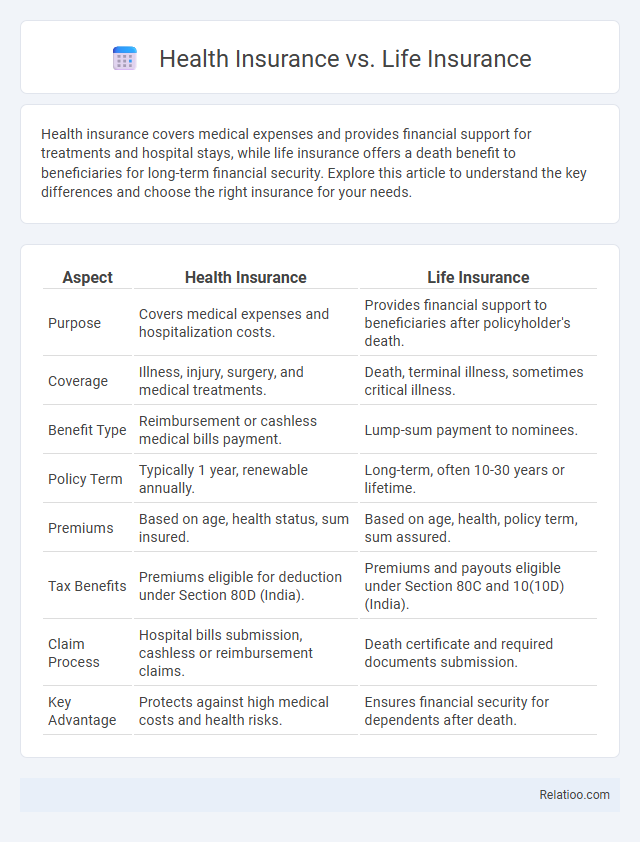Health insurance covers medical expenses and provides financial support for treatments and hospital stays, while life insurance offers a death benefit to beneficiaries for long-term financial security. Explore this article to understand the key differences and choose the right insurance for your needs.
Table of Comparison
| Aspect | Health Insurance | Life Insurance |
|---|---|---|
| Purpose | Covers medical expenses and hospitalization costs. | Provides financial support to beneficiaries after policyholder's death. |
| Coverage | Illness, injury, surgery, and medical treatments. | Death, terminal illness, sometimes critical illness. |
| Benefit Type | Reimbursement or cashless medical bills payment. | Lump-sum payment to nominees. |
| Policy Term | Typically 1 year, renewable annually. | Long-term, often 10-30 years or lifetime. |
| Premiums | Based on age, health status, sum insured. | Based on age, health, policy term, sum assured. |
| Tax Benefits | Premiums eligible for deduction under Section 80D (India). | Premiums and payouts eligible under Section 80C and 10(10D) (India). |
| Claim Process | Hospital bills submission, cashless or reimbursement claims. | Death certificate and required documents submission. |
| Key Advantage | Protects against high medical costs and health risks. | Ensures financial security for dependents after death. |
Understanding Health Insurance
Health insurance provides financial coverage for medical expenses, including doctor visits, hospital stays, and prescription medications, essential for managing unexpected health costs. Unlike life insurance, which pays out a death benefit to beneficiaries, health insurance focuses on ongoing healthcare needs and preventive services. Understanding health insurance involves recognizing policy types such as HMOs, PPOs, and high-deductible plans, as well as coverage limits, premiums, and out-of-pocket costs critical for choosing the right plan.
What is Life Insurance?
Life insurance provides financial protection by paying a designated beneficiary a sum of money upon your death, helping cover expenses like funeral costs, debts, or income replacement. Unlike health insurance, which covers medical expenses for illnesses or injuries, life insurance focuses on long-term security for your loved ones. Understanding the distinct purpose of life insurance can help you choose the right coverage to secure your family's financial future.
Key Differences Between Health and Life Insurance
Health insurance covers medical expenses such as hospital stays, treatments, and surgeries, providing financial protection against unexpected healthcare costs. Life insurance offers a death benefit to beneficiaries when the insured person passes away, ensuring financial support for dependents. Unlike general insurance that can include property or auto coverage, health and life insurance specifically focus on protecting against health-related costs and providing financial security after death, respectively.
Coverage Areas: Health vs Life Insurance
Health insurance primarily covers medical expenses such as hospitalization, doctor visits, prescription drugs, and preventive care, ensuring your healthcare costs are manageable during illness or injury. Life insurance provides financial protection for your beneficiaries by paying a death benefit upon your passing, helping cover expenses like funeral costs, debts, and income replacement. Understanding the distinct coverage areas of health insurance versus life insurance is crucial for selecting policies that best protect your health needs and your family's financial future.
Benefits of Health Insurance
Health insurance provides crucial financial protection by covering medical expenses such as doctor visits, hospital stays, and prescription medications, helping You avoid high out-of-pocket costs. Unlike life insurance, which offers a payout to beneficiaries after death, health insurance ensures access to timely healthcare services and preventive care that maintain Your overall well-being. Insurance in general offers risk management, but health insurance specifically supports Your physical health needs through comprehensive coverage and wellness programs.
Advantages of Life Insurance
Life insurance offers unique advantages by providing financial security and peace of mind through coverage tailored to protect your family's future in case of your untimely death. Unlike health insurance, which covers medical expenses, life insurance ensures beneficiaries receive a lump sum or regular payments that can be used for debts, living expenses, or education costs. Your choice of life insurance policy can also build cash value over time, serving as both a protective and investment tool.
Cost Comparison: Health Insurance vs Life Insurance
Health insurance typically involves regular premium payments based on age, health, and coverage, often covering medical expenses like doctor visits and hospital stays, which can vary widely in cost. Life insurance premiums depend on factors like age, health, policy type, and coverage amount, usually being lower than health insurance for younger individuals but increasing with age and health risks. Understanding these cost differences helps you make informed decisions to balance coverage needs and budget effectively.
Choosing the Right Insurance for Your Needs
Choosing the right insurance for your needs involves understanding key differences between health insurance, life insurance, and general insurance. Health insurance covers medical expenses and protects your finances during health emergencies, while life insurance provides financial security to your beneficiaries in case of your untimely death. Evaluating your personal circumstances, health risks, and financial goals helps you select the insurance policy that best supports your long-term well-being.
Common Myths About Health and Life Insurance
Health insurance and life insurance serve different purposes but often face common myths that can confuse Your decision-making. Many believe health insurance covers all medical expenses, yet it usually excludes certain treatments or has limits, while life insurance myths include the misconception that it only benefits after death, ignoring policies that accumulate cash value or provide living benefits. Understanding these distinctions helps debunk false assumptions and ensures You choose appropriate coverage based on accurate information.
Final Thoughts: Which Insurance Should You Choose?
Choosing between health insurance, life insurance, and other types of insurance depends on your personal financial goals and risk tolerance. Health insurance provides essential coverage for medical expenses, life insurance offers financial security for your beneficiaries after your death, and general insurance protects assets against unforeseen risks. Evaluating your current needs, future obligations, and budget will help determine the most suitable insurance policy to ensure comprehensive protection.

Infographic: Health Insurance vs Life Insurance
 relatioo.com
relatioo.com